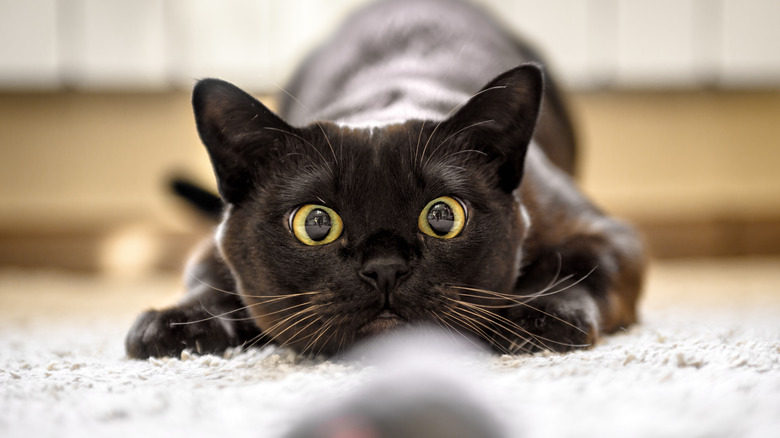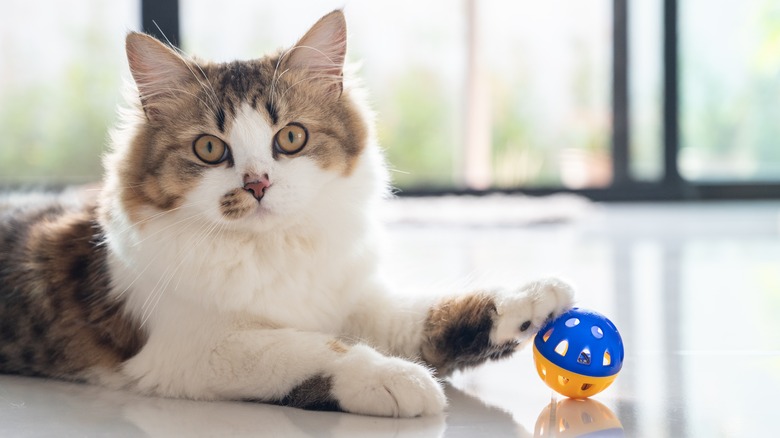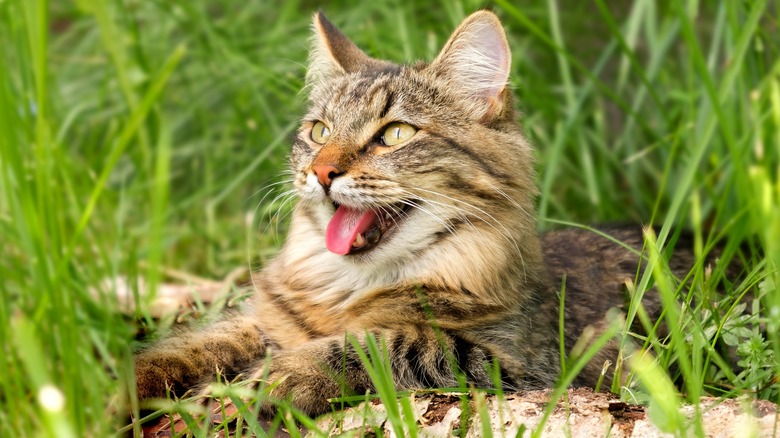Why Do Cats Bring Dead Animals To Their Owners?
Cats are, famously, inscrutable critters. Unlike dogs, which tend to wear their hearts on their merrily-wagging sleeves, our feline friends seem to be rather deeper creatures. You may pass them in the street sometimes, sitting in somebody's yard, looking at you with a mildly curious, haughty, judgmental sort of expression.
What are dogs thinking? Generally that they want a treat or they're desperate for head scratches. They're rather more readable, generally speaking. According to the RSPCA, dogs struggle with independence. Eight out of 10 dogs, the outlet reports, exhibit signs of separation anxiety when their beloved humans are away. Some cats, meanwhile, will quite happily leave the house for days at a time, perhaps returning for their food (unless they've taken a fickle liking to the food being prepared for them elsewhere) or a little attention before heading off again.
When roaming cats do deign to return to their humans' homes, they sometimes do so with a dead animal in their mouths, which they'll proudly present to said humans. Why do they do this? There are several factors in this behavior, and let's take a look at some of them.
Natural born hunters
Many animals have a natural need to teach their young to hunt. For example, this behavior has been seen in orcas. On the BBC's documentary "Patagonia: Earth's Secret Paradise," the intelligent creatures are identified as group hunters, and depicted pursuing seals just off the shore as a family. The mother times her assault with a wave that propels her towards her prey, with the orcas moving at an angle so their dorsal fins are hidden. "This is a highly specialized technique that it's taken her years to master," the narrator explains, having first stated that "... the orca is not a lone killer. She's a mom too, teaching her own family how to hunt."
Like these ocean titans, cats are also cunning, powerful hunters. In the wild, there are few land predators more imposing than big cats. Domestic cats may not be as large and strong as big cats (the largest of which is the Siberian tiger, per National Geographic, reaching sizes of over 10 feet long and 660 pounds), but they also have sharp claws and teeth and they don't tend to be afraid to use them.
When your kitty companion brings you a dead spider, mouse, or another small beast, then, it seems they're also making use of those hunting instincts. Many domestic cats, moreover, need look no further than their bowls at mealtimes, thanks to humans. It appears to be part of our evolving influence on the cays that cause this rather grisly behavior. Here's why.
There's no place like home (for gross dead things)
Live Science reports that cats, like the orcas and other species, want to pass their hunting skills on to the next generation. Here's the rub, though: In April of 2009, the study "Population characteristics and neuter status of cats living in households in the United States," by Karyen Chu et al (via the American Veterinary Medical Association), concluded that 80 percent of pet cats in the United States have been neutered or spayed.
The study does not take into account wild or stray cats, a number that it concedes "... represent[s] a substantial but unknown percentage of the total U.S. cat population." Regardless, Live Science goes on, the result is that cats don't tend to have kittens. Their owners are their humans, it seems, and so we get the joys of unfortunate creatures on our doorsteps.
Our furry friends have the best of intentions, according to Anita Kelsey, cat behavior expert and writer of "Let's Talk About Cats." Kelsey told The Sun that cats may be trying to teach their humans to hunt, as per their natural role. Not only that, but by returning home with them, they're telling you just how happy they are with you. "The home is the core safe area for cats — so it makes sense to bring the prey/catch home to an area they feel comfortable and secure," Kelsey stated.


